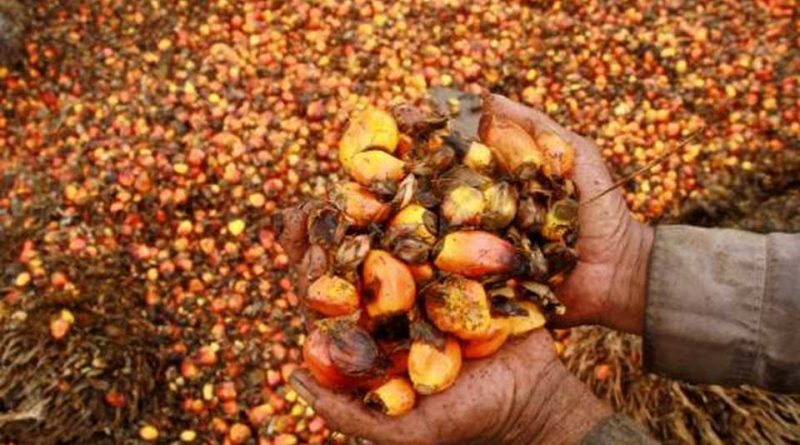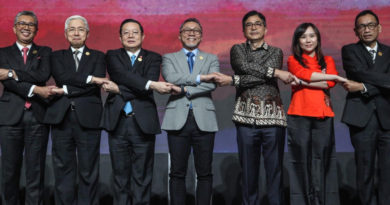Biz Commentary: East Can Meet West on Palm Oil Controversy -By Rizal Algamar
Commentary: East Can Meet West on Palm Oil Controversy
BY : RIZAL ALGAMAR
“East is East and West is West, and never the twain shall meet.” This often-quoted first line from 1907 Nobel laureate Rudyard Kipling’s poem, “The Ballad of East and West,” could well apply to present-day supporters and opponents of palm oil production.
The debate on the economic benefits versus the environmental and social costs of palm oil production is often based on zero-sum assumptions on both sides. But the complex issues facing the palm oil sector cannot easily be seen through a stark black-and-white perspective.
If the major challenge is to harmonize the interests of multiple stakeholders and at the same time, address both short-term development goals and long-term environmental objectives, a more balanced and solution-oriented perspective is required from both sides.
.
ADS by Cloud 9:
.
– SPACE RESERVE FOR YOUR ADVERTISEMENT –
.
.
The palm oil industry is mired in so much global controversy today that it is easy to forget its long history as a valued commodity. Originating in West Africa, palm oil has been used for more than 5,000 years. Along the way, palm oil played a major role in the start of the First Industrial Revolution when it became an essential ingredient in such early products as candles and industrial lubricants. Its use contributed to the expansion of industrial production, encouraged overseas trade and the spread of colonialism. The demand for palm oil led to investment in palm oil plantations, first in West Africa, then in Southeast Asia, particularly in parts of present-day Malaysia and Indonesia, which were under colonial rule ate the time. East did indeed meet West, but not on equal terms.
Palm oil still plays an important role in the global economy, in what is now the Fourth Industrial Revolution. Global palm oil production continues to expand, sparked by global demand. Worldwide demand is expected to double to 240 million metric tons by 2050.
.
ADS by Cloud 9:
.
– SPACE RESERVE FOR YOUR ADVERTISEMENT –
.
.
By the 1960s, demand was large enough that about half of the global production of oil palm was exported. By 2014, the demand had accelerated so that 75 percent of the expanded global production was exported. This is not surprising, considering that palm oil remains an essential ingredient in many consumer products, ranging from lipstick and soap to ice-cream and chocolate. By some estimates, about half of all packaged products contain palm oil.
In the 1980s, Malaysia was the world’s largest palm oil producer, but by 2006, Indonesia had surpassed its neighbor and by 2008, the archipelago also became the world’s largest exporter of the commodity. By 2017, Indonesia exported 31 million tons of palm oil, or 75 percent of its total output, which was about half the country’s total agricultural exports.
This performance is not surprising given Indonesia’s status as the world’s lowest-cost palm oil producer, aided substantially by its low cost of land and labor. Such conditions make the palm oil sector attractive to investors, but also to Indonesian smallholder farmers. Smallholders own approximately 40 percent of the total oil palm plantations, accounting for about 35 percent of the crude palm oil produced in Indonesia.
.
ADS by Cloud 9:
.
– SPACE RESERVE FOR YOUR ADVERTISEMENT –
.
.
Global Controversy
Oil palm has provided producing countries with economic benefits, such as additional foreign exchange revenue, but there are also important indirect benefits, such as local infrastructure development, rural poverty reduction and other multiplier effects. However, these benefits have been overshadowed by the global controversy over palm oil, aimed primarily at the two major producers, Indonesia and Malaysia.
The forest fires that raged across Indonesia for months in 1997 and 1998 were instrumental in turning palm oil production in Indonesia into a global issue. The 700 million tons of carbon released by the deforestation amounted to a fifth of annual global emissions. Forests fires continued to be a major problem over the years. And the increasing global demand for palm oil fueled more deforestation – even with increased production from existing oil palm plantations.
Besides deforestation and biodiversity loss, controversy arose over multiple issues arising from illegal land clearing, community evictions, watershed degradation, river pollution and worker’s rights and the use of child labor. This drew criticism, not only from local nongovernmental organizations and civil society groups in Indonesia, but also from international NGOs and other, mostly Western, countries. The Indonesian government has been particularly sensitive to criticism from the latter, invoking the national interest in pushing back against the criticism.
.
ADS by Cloud 9:
.
– SPACE RESERVE FOR YOUR ADVERTISEMENT –
.
.
National Interest
The Indonesian government has framed the defense of its policies on the palm oil sector as a matter of national interest. For example, in early 2018, the Indonesian Embassy in Brussels issued a statement protesting European Parliament policies that it viewed as unfair and protectionist against palm oil stating: “Palm oil is one of primary elements of Indonesia’s national interest, notably because it is related to the prosperity of 17 million Indonesian citizens, including smallholder farmers, who directly and indirectly depend on the palm oil industry.”
Later, at the Indonesian Palm Oil Conference in Nusa Dua, Bali, in November last year, Coordinating Economy Affairs Minister Darmin Nasution linked the importance of the oil palm sector to the country’s national interest in attaining the United Nations Sustainable Development Goals by, for example, generating foreign exchange and contributing to education and health.
.
ADS by Cloud 9:
.
– SPACE RESERVE FOR YOUR ADVERTISEMENT –
.
.
However, the minister also equated the national interest to the development of a sustainable palm oil sector, saying: “Given the importance of the palm oil sector to Indonesia’s development, it is in our own national interest to ensure that further development of the oil palm sector takes into account the principle of sustainability. It is our obligation that this sector is managed carefully and responsibly for the sake of the future generations.”
The minister held up improvement in the certification system for the palm oil industry – Indonesian Sustainable Palm Oil (ISPO) – as an important illustration of the sustainable direction the government is taking in palm oil. ISPO was established in 2011 to promote sustainable management of palm oil in the country. But it has often been criticized for being less robust and transparent than the Roundtable on Sustainable Palm Oil (RSPO), the certification system established by palm oil producers and buyers in 2004 to minimize the impact on forests, wildlife and communities. Indeed, both the RSPO and ISPO continue to come under attack for weak governance that allow the violation of standards to continue.
To overcome these weaknesses, Indonesia is taking steps to improve the transparency and credibility of its ISPO standards through a multi-stakeholder process involving the government, private sector and community.
.
ADS by Cloud 9:
.
– SPACE RESERVE FOR YOUR ADVERTISEMENT –
.
.
However, such institutional strengthening will not help much if the root problems in the rule of law in Indonesia are not resolved – a long and arduous task not restricted to the palm oil sector alone. Fundamental issues of transparency, accountability and governance must be addressed to ensure the palm oil sector’s sustainability.
.
ADS by Cloud 9:
.
– SPACE RESERVE FOR YOUR ADVERTISEMENT –
.
.
Unintended Consequences
Making palm oil production more sustainable becomes more important because alternatives to palm oil could lead to even more deforestation. Alternative oils such as soya and colza have caused more deforestation than palm oil. Clearing land for cattle farming can do even more damage.
So the one choice is to make the palm oil sector sustainable. And to do so, an inclusive multi-stakeholder approach is needed to improve transparency, accountability and governance.
The failure of the Indonesian Palm Oil Pledge (IPOP) is an object lesson on the need for such an approach.
In 2014, Indonesia’s largest palm oil producers showcased, with good intentions, their commitment to palm oil sustainability by signing the pledge during the UN Climate Change Conference in New York. But lacking prior multi-stakeholder buy-in from some government quarters and other palm oil producers, IPOP was dissolved in 2016 after pressure from the Indonesian government.
This negative outcome underlines the need for a multi-stakeholder platform, a broad-based sustainable palm oil coalition, which can develop and implement sustainability by creating shared values through best practices and lessons. Such a broad-based sustainable palm oil coalition can house the constructive dialogue essential for the future of the commodity.
ADS by Cloud 9:
.
– SPACE RESERVE FOR YOUR ADVERTISEMENT –
.
.
But making the palm oil sector sustainable while neglecting the sustainability of other sectors of the economy would be an exercise in futility. A comprehensive approach to ensure sustainability across sectors and across larger-scale geographic areas is required. One practical approach, known as Development by Design, or DBD, is already practiced and can be scaled up to cover wider areas.
DBD takes into account both the importance of sustainable livelihoods (development) and conservation. Pioneered by US-based charitable environmental organization The Nature Conservancy, the DBD approach is being piloted in areas such as Berau district in East Kalimantan, through the province-wide Green Growth Compact.
The key to the jurisdiction-wide scope of DBD is the conscious balancing of choices related to economic livelihoods and conservation interests.
The balancing is done through a three-step hierarchical and sequential mitigation approach: avoid impacts, minimize impacts and offset impacts (only if there are unavoidable negative impacts). The approach is both evidence-based and intensely consultative, to ensure desired sustainable outcomes as much as possible. Current DBD programs piloted in East Kalimantan can be scaled up to the national level. Once implemented on the national scale, a new sustainable trajectory that accounts for economy and ecology can begin.
ADS by Cloud 9:
.
– SPACE RESERVE FOR YOUR ADVERTISEMENT –
.
.
East Can Meet West
In the meantime, can East meet West on the matter of palm oil? It is possible, if we abandon zero-sum approaches. Klaus Schwab, founder and executive chairman of the World Economic Forum, emphasized the need to do so when we face the challenges associated with the Fourth Industrial Revolution.
“As we develop a new approach to the new economy, we must remember that we are not playing a zero-sum game. This is not a matter of free trade or protectionism, technology or jobs, immigration or protecting citizens, and growth or equality. Those are all false dichotomies, which we can avoid by developing policies that favor ‘and’ over ‘or,’ allowing all sets of interests to be pursued in parallel,” Schwab said.
A new cooperative approach that engages all stakeholders is required. After all, Kipling’s famous quotation on the intractable East/West condition is a misinterpretation. What comes after the quotation makes it abundantly clear that, given mutual respect and interests, to broadly paraphrase Kipling, East can indeed meet West.
FEBRUARY 13, 2019
.
ADS by Cloud 9:
.
– SPACE RESERVE FOR YOUR ADVERTISEMENT –
.
.
Rizal Algamar has been the country director of The Nature Conservancy in Indonesia since 2012 and chairman of the management board of Yayasan Konservasi Alam Nusantara since 2015. With more than 25 years’ experience in both the corporate and nonprofit sectors, Rizal’s background includes corporate sustainability, creating shared values, international trade and business development, fast-moving consumer goods and finance at various Indonesian conglomerates.
.
ADS by Cloud 9:
.
– SPACE RESERVE FOR YOUR ADVERTISEMENT –
.
.
.
![]() All photographs, news, editorials, opinions, information, data, others have been taken from the Internet ..aseanews.net | [email protected] |
All photographs, news, editorials, opinions, information, data, others have been taken from the Internet ..aseanews.net | [email protected] |
For comments-Email to : Pahulu Gan|
. [email protected]









